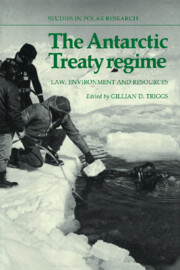Book contents
- Frontmatter
- Contents
- List of contributors
- List of Antarctic Treaty Parties
- Foreword
- Introduction
- Frontispiece: Map of national claims
- Part I Antarctica: physical environment and scientific research
- Part II The Antarctic Treaty regime: legal issues
- Part III The Antarctic Treaty regime: protecting the marine environment
- 9 Introduction
- 10 The Antarctic Treaty system as a resource management mechanism
- 11 Regulated development and conservation of Antarctic
- 12 Recent developments in Antarctic conservation
- 13 Environmental protection and the future of the Antarctic: new approaches and perspectives are necessary
- Part IV The Antarctic Treaty regime: minerals regulation
- Part V Whither Antarctica? Future policies
- Part VI Conclusion
- Selected reading
- Appendix 1
- Appendix 2
13 - Environmental protection and the future of the Antarctic: new approaches and perspectives are necessary
Published online by Cambridge University Press: 20 January 2010
- Frontmatter
- Contents
- List of contributors
- List of Antarctic Treaty Parties
- Foreword
- Introduction
- Frontispiece: Map of national claims
- Part I Antarctica: physical environment and scientific research
- Part II The Antarctic Treaty regime: legal issues
- Part III The Antarctic Treaty regime: protecting the marine environment
- 9 Introduction
- 10 The Antarctic Treaty system as a resource management mechanism
- 11 Regulated development and conservation of Antarctic
- 12 Recent developments in Antarctic conservation
- 13 Environmental protection and the future of the Antarctic: new approaches and perspectives are necessary
- Part IV The Antarctic Treaty regime: minerals regulation
- Part V Whither Antarctica? Future policies
- Part VI Conclusion
- Selected reading
- Appendix 1
- Appendix 2
Summary
The big picture
Recently at the South Pole a group of scientists, diplomats, academics, international lawyers, journalists and environmentalists had the opportunity to view a graph of the increase in carbon dioxide levels during the past 20 years – over 25%, in a straight line. The data on which that graph is based underpins the so-called greenhouse effect theory.
This chapter is founded on the belief that it is important to keep Antarctica in perspective, against the backdrop of other developments in the world community, when determining policies for its future. For example, if scientists such as those responsible for a 1984 study by the US National Academy of Science are right about the implications of a continued build-up of carbon dioxide levels and the theory of the greenhouse effect, temperatures on earth will rise by 2 or 3 deg C during the next 75 years. That could cause the west Antarctic ice sheet to melt, raising the ocean levels by a significant – even radical – degree. What energy policy would it be prudent for world leaders to follow?
If those scientists who are concerned about the phenomenon of acid rain are correct that it will continue to bankrupt various components of the global ecosphere, and that its primary cause is the increased burning of fossil fuels in vehicles, power plants and smelters, the question arises as to the conservative approach which the world community should take concerning continued reliance on such energy sources.
- Type
- Chapter
- Information
- The Antarctic Treaty RegimeLaw, Environment and Resources, pp. 150 - 158Publisher: Cambridge University PressPrint publication year: 1987
- 2
- Cited by



